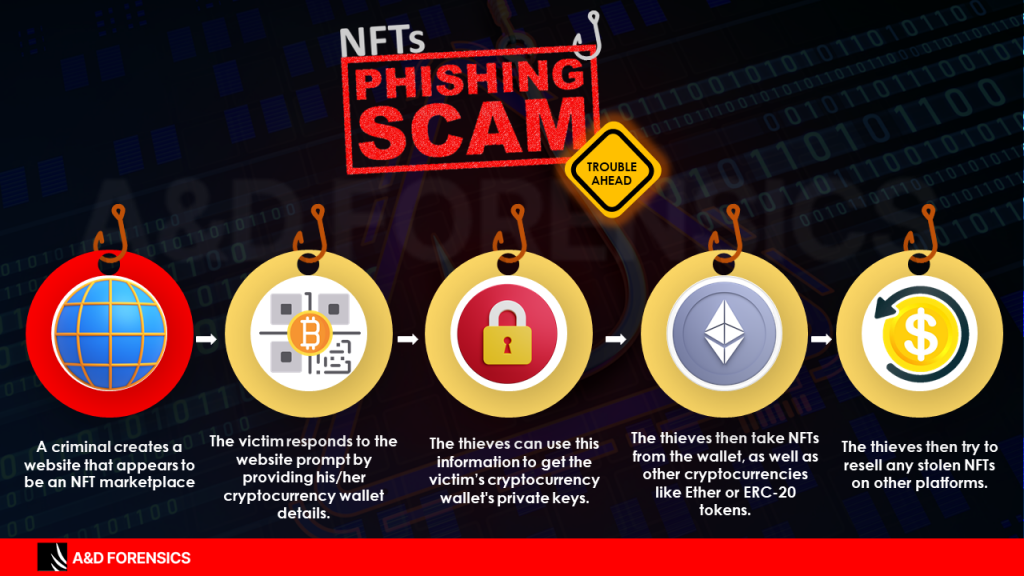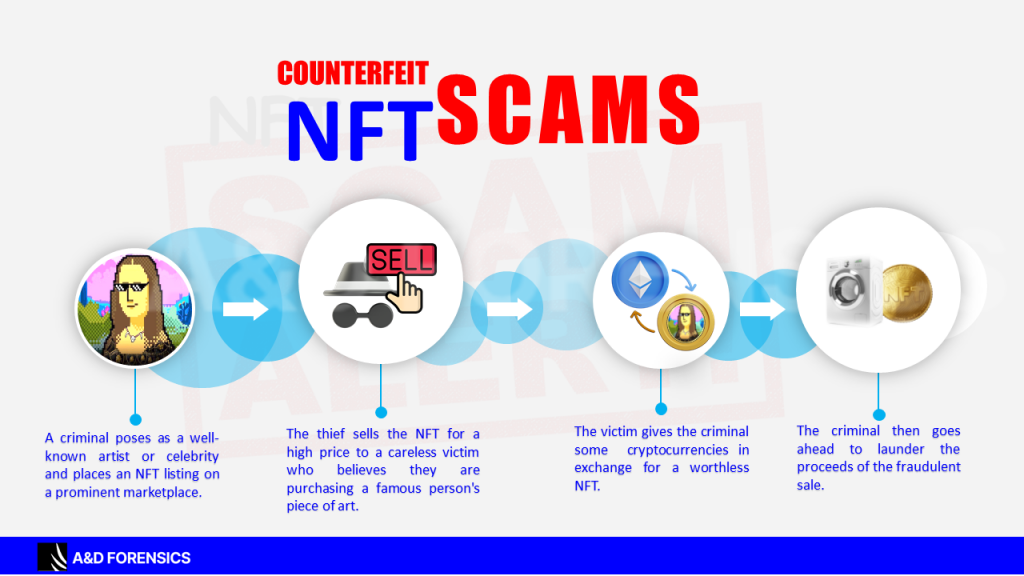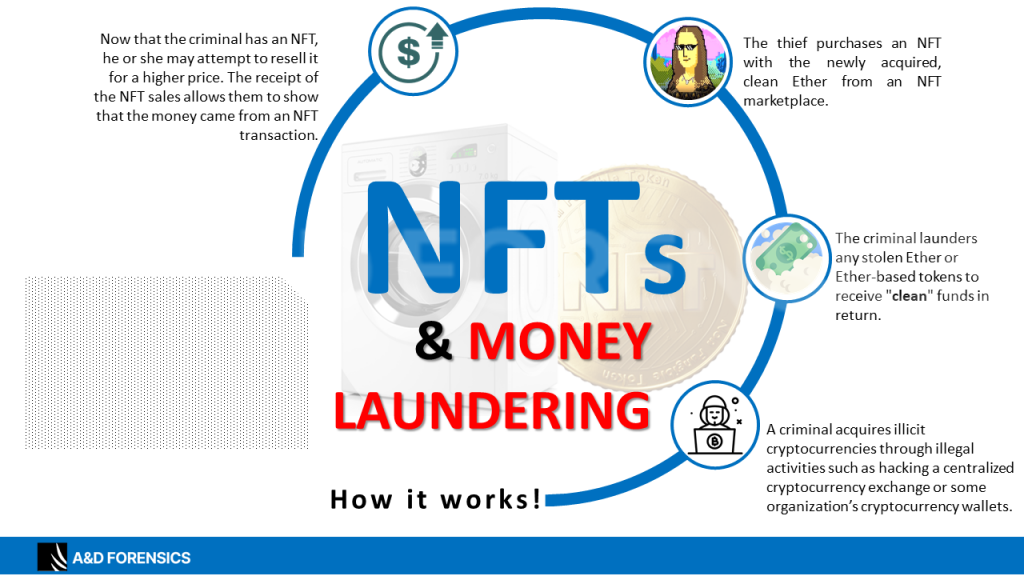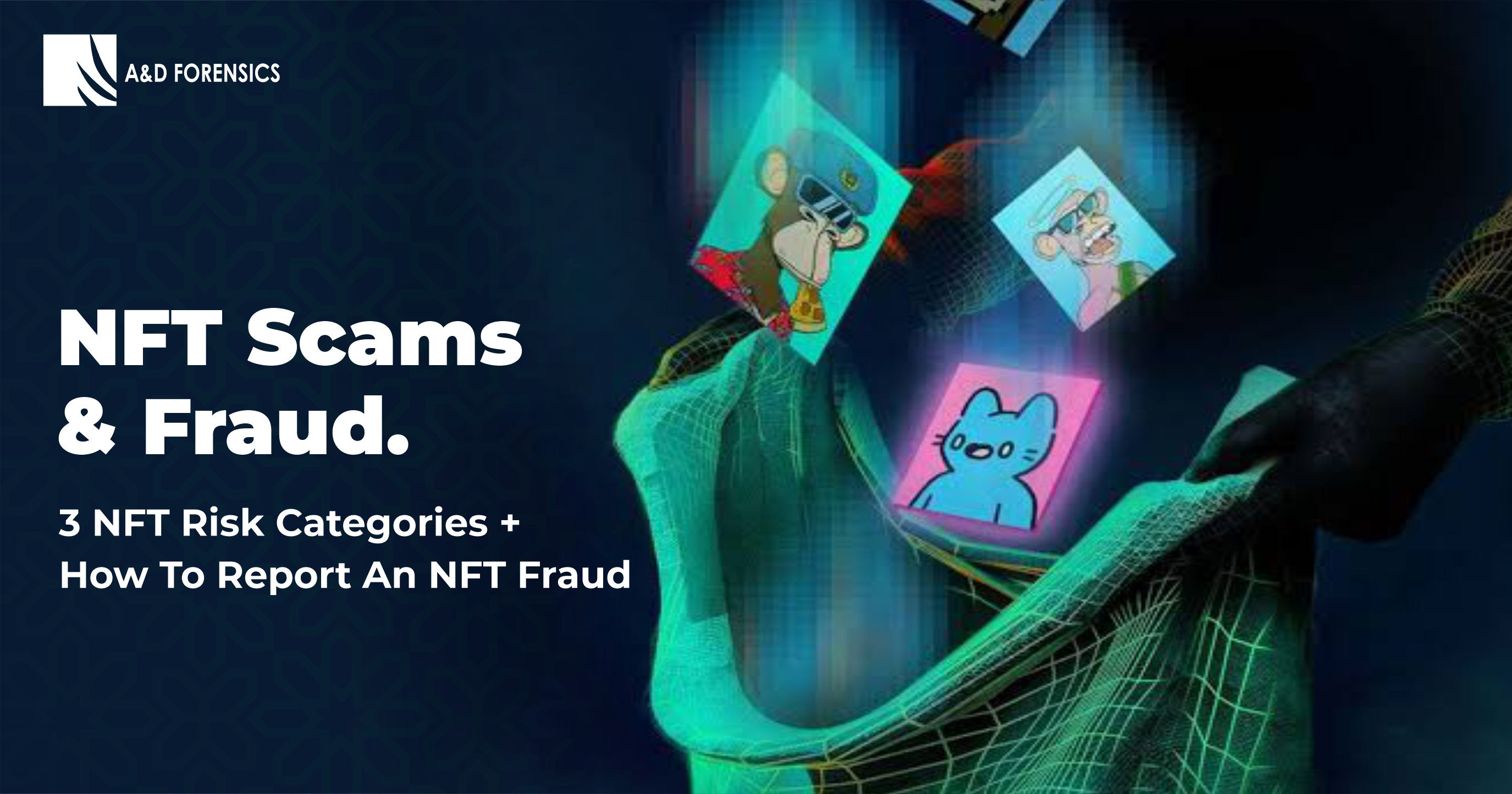The NFT marketplaces have rapidly evolved leading to a lot of NFT Scams and Fraud cases. This has also given prospects for NFT Fraud and manipulation, as well as a new possible way of money laundering using cryptocurrencies. Hence, This article highlights 3 NFT risk categories, how to prevent NFT Frauds and how to report NFT Frauds when you become a victim.
What are NFTs?
Non-Fungible Tokens (NFTs) are digital units or tokens that represent ownership of photos, movies, audio files and other digital assets. They are built on the blockchain technology which is the same technology upon which cryptocurrencies are built. In addition, they are derived cryptographically which makes them publicly verifiable and digitally unique. NFTs are not cryptocurrencies, however, they can be traded with cryptocurrencies. Lastly, they transmit ownership across cryptocurrency wallets and run on smart contracts.
3 NFT Risk Categories discussed in this article include:
- NFT Scams and Frauds
- NFT Sanction Evasions
- NFTs and Money Laundering.
What are NFT Scams and Frauds?
NFT Scams and frauds involve dishonest and illegal activities carried out with Non-Fungible Tokens (NFTs). NFTs aren’t scams, however, illicit actors can leverage on NFTs to extort cryptocurrencies from their victims.
How NFT Scams and Frauds work
The Modus operandi of some notable NFT scams and frauds are discussed below:
- Wash Trading: This kind of NFT Scam is carried out to artificially boost demand. The NFT creator simultaneously buys and sells the same NFT asset to create artificial and misleading market activity. According to Chainalysis, the largest wash trader actually lost some money.
- Reward Manipulation: In this case, NFT trades are inflated so as to alter the reward model. This can include betting that the rewards gotten from the tokens will be more valuable than the transaction fees. Collectors then rush in to buy the NFTs despite high gas fees as in the case of Ethereum, thereby leading to an overall increase in the price of the asset due to demand.
- Front-Running: This involves an insider of an NFT project going ahead to buy the project before it officially gets listed on the market place. He/she immediately sells it off as soon as it’s listed on the market place. A Case study is the Open Sea employee who resigned after ‘front-running’.
- NFT Rug pull: In this kind of NFT Fraud, the NFT seller disappears with the buyer’s money without releasing the NFT as promised. In some cases, the NFTs might be sent but not what they actually appear as.
- Phishing scams: Here, criminals establish fake cloned websites of the original websites.They do this to deceive collectors into thinking they are in the right marketplace. Some bad actors can pretend to be customer support, hence misleading collectors to provide sensitive data so as to steal from them. The phishing attack exploit that affected 17 users on OpenSea is a case study.

- Code Exploits and Bugs: Smart contracts are written by humans. This simply means that errors can be found. This can lead to accounts being hijacked and funds stolen by criminals.
- Broken Storage Sites: This kind of NFT scam results to your NFT assets disappearing! To explain this, first we need to understand two classes of NFTs such as: On-chain and Off-chain assets. Assets that are originally digital assets are on-chain while NFTs that represent ownership of a metadata file linked to real world assets are Off-chain assets. For most NFT Projects there are 2 elements: the digital asset itself and a smart contract that includes the metadata and a link to the location of the stored digital asset. If the hosting platform is on a centralized server and has the site shut down or the cloud storage location gets changed, you will lose access to the NFT.
- Counterfeit NFTs: This type of NFT Scam involves scammers stealing a creator’s/an artist’s artwork. Thereafter, they go ahead to auction it for sale on a marketplace. This is common among artists who have great fan base willing to acquire their artworks for some potential benefits like ticket access to concerts.

- Bidding NFT Scams: Bidding NFT scams occur when bidders in NFT market places swap the base currencies involved in the transaction leading to losses for the seller. The seller could end up receiving $3 instead of 3 ETH bargained for.
NFTS AND SANCTIONS RISK
Sanctioned individuals/nations listed on OFACc SDN list might try to leverage on NFTs to raise funds. Any Money Service Business or Virtual Asset Service Provider that aids the trade of NFTs associated with a sanctioned individual or entity could face punishments for sanctions evasion.
A peculiar case of where NFTs have been associated with OFAC’s Sanctioned Entities is the Chatex Crypto Exchange sanctioned on Nov 8, 2021 by OFAC after facilitating ransomeware activities. According to Elliptic, NFTs were found among the Chatex address listed by OFAC. These NFTs were listed on a popular NFT market place and the value was approximately $531,600.
MONEY LAUNDERING WITH NFTs
NFT marketplaces are platforms where NFTs can be minted, bought or sold. These market places have experienced explosive growth in 2021. . Some NFT marketplaces include: Rarible, Opensea, SuperRare and Foundation. Nifty Gateway.The interaction between DeFi platforms and NFTs have attracted more investors with high liquidity to NFT marketplaces. However, this has led to the increase in money laundering activities with NFTs.
According to FATF, criminal organizations and terrorist financiers use 3 major strategies to transport money inorder to conceal its origins and move it into the legitimate market. The first strategy is through the financial system. Then, the next strategy is through the physical movement of money. The last strategy occurs through the physical movement of products through the trade system. This third strategy is called Trade Based Money Laundering -TBML.
The TBML approach is applicable to NFTs due to the high liquidity available in NFT marketplaces. NFT marketplaces are also facilitated by the huge amount of money that can be moved quickly within the platforms. In addition, with the intersection between DeFi platforms and NFTs, traders can easily buy and sell NFTs with cryptocurrencies such as Ether on Dapps.

6 Ways to Avoid Becoming a Victim of NFT Scams and Frauds.
- As an individual, always conduct Due Diligence on the NFT you want to purchase.
- Implement 2-factor authentication protocol for your accounts and protect your password.
- To avoid being a victim of counterfeit NFTs, always ensure that you buy from a verified account. Also, carry out due diligence by checking out the artist on social media to inquire if the artwork you intend to purchase is theirs.
- Always confirm the currency you transact with before concluding NFT transactions. This prevents you from being a victim of NFT bidding scams.
- As a project builder, audit your smart contracts to avoid giving opportunities for scammers to exploit your project.
- Store your assets securely to avoid being a victim of broken storage sites. You can confirm how your assets are stored here.
Preventing NFT Scams and Frauds in Financial Institutions.
VASPS, MSBs, and Cryptocurrency exchanges can help limit NFT crimes by:
- Using wallet screening solutions like Elliptic lens, Chainalysis, TRM to determine if a wallet is linked to an NFT scams.
- Using blockchain analytic and transaction monitoring tools to identify and trace transactions including NFTs scams,crimes.
- Establishing effective compliance units with qualified and trained compliance officers who apply Risk Based approach should be established.
- Mitigating controls such as KYC, EDD should be implemented and virtual site visits should be conducted on NFT community platforms.
How to Report NFT Scams
If you become a victim of NFT scams, send your case to investigations@adforensics.com.ng. In addition, you can go ahead to open a case here. After submission, the Investigation unit will evaluate your case for possible investigations. This will be done using the available blockchain analytic tools at A&D Forensics lab from our partners.
Conclusion
NFTs are still evolving and it’s imperative that users protect themselves from becoming victims of possible NFT scams. As a Financial institution, VASP, or MSBs, you are advised to have trained and qualified compliance officers.These compliance officers will be able to handle your compliance units and effectively screen and monitor wallets associated with NFT scams to ensure a safe ecosystem for your clients. These Compliance trainings are offered at A&D Forensics offers compliance trainings for financial institutions.






